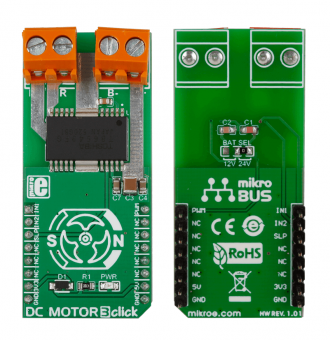
We strongly encourage users to use Package manager for sharing their code on Libstock website, because it boosts your efficiency and leaves the end user with no room for error. [more info]

Rating:
Author: MIKROE
Last Updated: 2019-03-08
Package Version: 1.0.0.1
mikroSDK Library: 1.0.0.0
Category: Brushed
Downloaded: 6011 times
Not followed.
License: MIT license
DC Motor 3 click is a mikroBUS add-on board with a Toshiba TB6549FG full-bridge driver for direct current motors. The IC is capable of outputting currents of up to 3.5 A with 30V, making it suitable for high-power motors.
The click communicates with the target MCU through the mikroBUS PWM pin.
Designed to use a 3.3 power supply only.
Do you want to subscribe in order to receive notifications regarding "DC Motor 3 click" changes.
Do you want to unsubscribe in order to stop receiving notifications regarding "DC Motor 3 click" changes.
Do you want to report abuse regarding "DC Motor 3 click".

Library Description
The library covers all the necessary functions to control DC Motor 3 Click board. DC Motor 3 Click communicates with the target board via the PWM module. This library contains drivers to enable or disable the engine, for rotation in the clockwise or counterclockwise direction, for the break and stop the motor and for PWM function: initialization, for sets duty ratio, starts and stops PWM module.
Key functions:
void dcmotor3_counterClockwise()- Set the direction of rotation in the counter clockwise direction function.Examples description
The application is composed of three sections:
void applicationTask()
{
mikrobus_logWrite( " Brake the engine ", _LOG_LINE );
dcmotor3_shortBrake();
Delay_1sec();
mikrobus_logWrite( "---------------------", _LOG_LINE );
mikrobus_logWrite( " Clockwise ", _LOG_LINE );
dcmotor3_clockwise();
Delay_1sec();
for ( dutyCycle = 500; dutyCycle < 3000; dutyCycle += 250 )
{
dcmotor3_pwmSetDuty( dutyCycle );
mikrobus_logWrite( " >", _LOG_TEXT );
Delay_1sec();
}
mikrobus_logWrite( "", _LOG_LINE );
mikrobus_logWrite( "---------------------", _LOG_LINE );
mikrobus_logWrite( " Brake the engine ", _LOG_LINE );
dcmotor3_shortBrake();
Delay_1sec();
mikrobus_logWrite( "---------------------", _LOG_LINE );
mikrobus_logWrite( " Counter Clockwise ", _LOG_LINE );
dcmotor3_counterClockwise();
Delay_1sec();
for ( dutyCycle = 3000; dutyCycle > 500; dutyCycle -= 250 )
{
dcmotor3_pwmSetDuty( dutyCycle );
mikrobus_logWrite( " <", _LOG_TEXT );
Delay_1sec();
}
mikrobus_logWrite( "", _LOG_LINE );
mikrobus_logWrite( "---------------------", _LOG_LINE );
Delay_1sec();
}
Additional Functions :
Other mikroE Libraries used in the example:
PWMUARTAdditional notes and informations
Depending on the development board you are using, you may need USB UART click, USB UART 2 click or RS232 click to connect to your PC, for development systems with no UART to USB interface available on the board. The terminal available in all MikroElektronika compilers, or any other terminal application of your choice, can be used to read the message